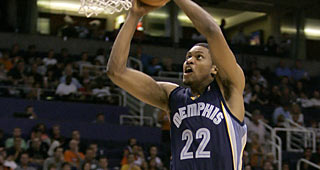The early reactions to the Memphis Grizzlies trading Rudy Gay to Toronto Raptors seem to fall in two camps: one thinks the trade was a very good one for the Grizzlies while the other, most notably Adrian Wojnarowski, see the trade as some sort of demolition of the strong team Memphis had put together. What makes this discrepancy so striking is that it feels like the second group has positioned themselves this way based on an off conception of how good Rudy Gay has actually been as a basketball player.
Immediately after reading Wojnarowski’s piece, a quote from an unusual source came to mind: in Win a Date with Tad Hamilton, one character turns down another by telling them it is “because you don't love me, you maybe want to love me. But I think what you love right now is the idea of me. You can't love someone for what they stand for or seem to be. You have to love them for their details, for the little things that are true of them and only them.”
In many ways, the critics of this deal are doing so from a love of the idea of Rudy Gay rather than the details of what he actually has been as a player thus far in his career.
As someone who got into professional basketball by writing obsessively about the NBA Draft, I fully understand the appeal of Gay. He came into the league as a physical specimen with some impressive hoops instincts as well.
Immediately after he was drafted, Jay Bilas described him on the broadcast as "Incredibly athletic, he's 6-foot-9, he's got really long arms, a wingspan of about 7-foot-3, he plays bigger than he is, he's got every skill, every piece of ability you would want in a player."
That description of Gay stuck and it created a persona of a guy who could do it all physically and was developing into a player who could take control of a team and a game. As Memphis went from being a rebuilding team to one that made the playoffs (incidentally helped by the reacquisition of the player Gay was traded for originally, Shane Battier), it became clear that while Gay had talent, he was not an essential cog in the Memphis machine. In fact, the No. 8 seed Grizzlies team that shocked the No. 1 Spurs in the 2011 playoffs did so with Rudy missing the entire postseason due to a shoulder injury.
The same story persists for those who prefer a more statistical edge to analysis. While no single stat gets particularly close to establishing player quality, my personal favorite is Win Shares/48. It takes the normal Win Shares concept and adds in a component scaling it for minutes played so it does not reward volume of time on the court and instead goes for something more akin to impact per minute played. Among players who logged 15 minutes per game and participated in at least half of the games in the season in question, the best Rudy Gay has ever finished in the league in WS/48 is a whopping 87th.
If you prefer PER, his best final position is 55th.
Incidentally, each of these high water marks occurred during the 2010-11 season where Rudy missed the end of the regular season and Memphis’ playoff run. Even 55th in the league does not mark any sort of elite player, especially considering Rudy has played substantially worse than that level this season. By just about any measure, Rudy Gay’s 2012-13 has been a disaster thus far.
Keeping all of this in mind, it feels like those who hate the trade for Memphis are more in love with the idea of Rudy Gay and what he could become as a basketball player than the understanding that a 26-year-old playing in his sixth season as a full-time starter can improve but just will not become the superstar everyone hoped he would progress into. He still can improve and absolutely has value to an NBA team but trading him (particularly for a solid player at the same position) does not cripple Memphis’ lofty aspirations in any meaningful way.
The deal for Memphis: On top of the analysis above, there are a few other major things to consider in terms of the Grizzlies here.
First, they were able to do a slight downgrade at small forward to Tayshaun Prince that saves the team about $10 million per season while still fitting what they do on the floor. Considering the money they have committed to other players, that flexibility allows them to add depth and continue to be a more versatile and challenging team moving forward.
Beyond that, Gay stands out as being younger than Zach Randolph by about five years, which likely means that he would have been given more of the reins of the team in a few seasons. If management reasonably surmised that he would not be particularly good at that even with positive development the next few years, moving him now for an older player makes it easier to make a bigger move down the line and spend more time trying to find the next big thing.
Speaking of that, the other major positive in the deal comes in the form of Ed Davis. While Davis only has two more years on his cheap rookie deal and then will want a hefty raise, he has been a revelation this season with the Raptors and gives Memphis an incredibly deep big man rotation. That depth can be used to withstand injuries since an injury to anyone other than Marc Gasol could be weathered by just moving everyone’s minutes up or it could be used in a trade down the line to strengthen the perimeter.
Considering Darrell Arthur and Davis both have team-friendly deals, Memphis’ front office could choose to trade either one of them for a nice return or make a bigger move and trade Zach Randolph. Heck, they could even keep this group together for a few years and then just choose between Davis and Randolph when Z-Bo becomes a free agent in 2015. Depth and flexibility (augmented with their flier on Austin Daye) coupled with largely reasonable salaries gives Memphis an advantage on and off the court moving forward.
Grade for Memphis: A
The deal for Toronto: I totally get the idea of using the specter of long-term cap flexibility to get talent that would be hard to procure in the free agent market. It stands as a strategy that more teams in non-major markets should employ moving forward. However, Toronto did not negotiate using that cap space as a major tool since they gave up a meaningful asset in Jose Calderon’s expiring contract and a young prospect in Ed Davis for the privilege of spending a ton of money on Rudy Gay for the next few seasons. In fact, by doing so Toronto gutted most of the trade assets they have that they are actually willing to move (leaving only Terrence Ross, Jonas Valanciunas, and Kyle Lowry as higher-end pieces) and leaving players that they want to keep around. As such, the combination of trading components and losing salary cap flexibility leaves Toronto with an OK team that will be tough to improve in the short term.
In terms of fitting on the court, acquiring Rudy Gay exacerbates the stupidity of extending DeMar DeRozan when they did. There are certain types of similar players that make sense to pair on the perimeter yet there are others that make very little sense. Both Gay and DeRozan are slashers that have severe limitations stretching the floor and creating for others at a high level. Putting them together allows teams to switch more and will not force them to make as many tough decisions, which should be the goal of any offensive philosophy. Instead of having an asset like DeRozan without a long-term commitment, the Raptors now have two players who do not make sense together making a combined $27.3M per season for at least the next two years. Ouch.
Grade for Toronto: D+
The trade for Detroit: As much as Tayshaun Prince has been an important part of the franchise and should age well, he does not fit this stage in the development for the Pistons. As such, getting out of his long-term salary commitment allows the team to get younger and fit their new core of Greg Monroe and Andre Drummond in both skill and age moving forward.
Unfortunately, we have seen recently what Joe Dumars can do to sink a team when he has cap space burning a hole in his pocket, though one would have to hope that he can do better this time. On top of that, Jose Calderon should be a nice fit shepherding the young guards Detroit already has on roster while lobbing the ball to Drummond all day, every day.
While we do not know what Calderon is looking for in his next team, it could also be possible to sign him to a reasonable deal and then make a decision about whether Brandon Knight actually makes sense as the future lead guard of the team or to trade him for a swingman and try again without the team falling off a cliff. A logical and practical trade for a team in desperate need of one.
Grade for Detroit: A-



